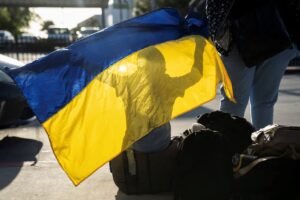
By Robert Golomb
Back in the crime ridden NYC of the early 1980’s, a teenaged Michael Codella was deciding what career path to pursue. By the time he had reached his 20th birthday in 1982, Codella had reduced the choices to just 2. Like his NYC Police Officer father, also named Mike Codella, he could become a cop. Or like a number of his close friends in his mob infested Brooklyn Canarsie neighborhood, he could join the Mafia.
Columnists rarely write stories about the lives of mob guys, so if you guessed that Codella became a cop, you would be correct. More importantly, if you read Codella’s book, Alpha Ville 1988: Welcome to Heroin City, which he co-authored in 2010 with journalist Bruce Bennet, you would probably understand why the story of Codella- first as a mob wannabe, and later as a plain clothes narcotics cop working undercover to stop drug trafficking in some of the most dangerous neighborhoods of New York City- was so compelling that Hollywood producers came close (albeit not close enough) to making the book shortly after its release in 2010 into a movie.
With what I had learned is renewed interest in the project in Hollywood, through some detective work of my own, I was able to contact Codella, whom I interviewed in his Staten Island home by telephone last week.
Loosely following the sequence of the book, Codella began our talk by describing his troubled teenage years. “The Canarsie I grew up in was half mob and half NYPD,’’ he explained. “Most of the guys I chose to run with, though, were the sons of “Wise Guys,” who aspired to become just like their fathers.
“I was no better than them,” continued Codella. “By the time I was 17, I was doing some bad things on 42nd Street and got shot at , but luckily missed, by a pimp,” Codella stated. “Around that same time, I was beating some tough amateur fighters in a local boxing gym. My name became known as a tough guy to a Gotti henchman and killer named Eddie Lino… He asked me to heist a local bar. And I took him up on his offer. So you see, my life could have taken a totally different path.”
Even though I had read in the book about the criminal background of his maternal grandfather, the decency of his father, and how it was his father who convinced him to become a cop, hearing it over the phone as Codella retold it was like listening to the incredible story for the first time.
“I didn’t know it back then when I was hanging out with the young wise guys, but found out about it years later when I was already a cop, and it hit me like a ton of bricks. My grandfather on my mother’s side, Giovanni Privetera, was a feared, respected and well-known Mafia associate, whose main turf was the Lower East Side of Manhattan,” stated Codella.
“So well- known and respected,” Codella went-on, “that New York’s first Godfather, “Joe ‘The Boss’ Masseria would borrow my grandfather’s stick pin to wear on mob sit downs. So well-known and respected that Lucky Luciano would bounce my mother and her 3 siblings, now my aunts and uncles, on his knee when visiting the after-hours social club that my grandfather owned.”
Still as attentive as I would have been had I not read the book, I listened intently as Codella explained what made him choose to lead a life that emulated that of his police officer father, rather than one that (while unknowingly to him at the time) followed the crime ridden path of his grandfather and his mob hopeful young friends in Canarsie.
“As I turned 20, I had a rude awakening. My tough guy friends from Canarsie were ending up in jail, on the lam or in cemeteries. By then, realizing the sorrow, horror and immorality of living a mob life, I listened to the advice of my father, who dreamed that I, just like he had for 20 years, become a police officer,’’Codella stated.
As Codella detailed in the book and reiterated to me, it was a decision which, within 2 years of becoming a cop, placed him in the middle of NYPD’s war against murderous drug dealers.
“ I was sworn in as a Police Officer on July 28, 1983 and was assigned to a precinct in Coney Island. That, as you might remember, was a time when illegal drug trade and the muggings, robberies, overdose deaths and murders that were its deadly spawn were running wild,” Codella recalled.
“So sometime in late 1984,” Codella elaborated, “at my request I was transferred to a command in Manhattan’s Lower East Side’s Alphabet City- ironically, in the same general area that my grandfather once controlled. After working there as patrol officer for a year, I was promoted to a plain clothes federally funded narcotics unit called ‘ Operation 8.’ This elite unit was formed and operated to end the narcotics trade in the Lower East Side, focusing mainly on Alphabet City, then known to law enforcement as the heroin capital of the world.”
It was mainly in the mean streets and housing projects of Alphabet City- the stretch of Manhattan land extending through Avenues A, B, C and D, and running between 14th Street in the north, Houston in the south and the FDR Parkway in the east- which, first just the 2 of them, and later in partnership with the DEA, Codella and his undercover police partner, “ Gio,” risked their lives to arrest drug dealers and permanently take them off the streets that they once ran.
“There were several drug lords and hundreds of drug dealers running the drug trade in the lower East Side and Alphabet City. Together they made life miserable for the tens of thousands of decent mostly poor and lower- and middle- class people who lived in public housing apartments there,” Codella explained.
“The crime was so rampant,” he continued, “that mothers could not stroll down the streets with their infants without the fear of being robbed by drug addicts. Kids could not play in the streets and parks without fear of being caught in the middle of a drive-by shooting. And the elderly could not leave their apartments without fear of being mugged or murdered for the few dollars they were carrying in their pockets.”
There would, as Codella proudly noted, soon be good news for the good people in those once tragic neighborhoods and bad news for the criminals. “As I described in the book,” Codella stated, “working undercover, Gio and I provided the brass with intelligence that resulted in the arrest and successful prosecution of hundreds of drug dealers.”
“With that,” he added, “the good people of the lower East Side and Alphabet City were beginning to feel safer. I was however, feeling a little less safe myself: around that time, drug dealers put a $50,000 bounty on my head.’’
Even while living with that bounty on his head, Codella and his partner were unhesitant to join a DEA unit in 1987 to help complete the job they had started. “The opportunity to work with the DEA, which made Gio and I the first New York cops to be assigned to partner with this agency in a non- task force capacity, made me forget about the price being put on my head,” recalled Codella.
It turned out, Codella told me just as he described in the book, to be a partnership which within only 1 year led to arrests of the major drug lord in the area along with approximately 40 of his drug-dealing underlings. After those arrests and successful prosecutions, law, order and safety had finally returned to the people of these once crime ridden communities.
“It was an incredible feeling,” exclaimed Codella, “for every officer in the unit to see the good people of those communities feel safe again.”
Codella’s drug fighting partnership (this time without Gio at his side) with the DEA did not end there. Codella stated that from 1989-1992 working once again as undercover cop with the DEA, he arrested and brought to justice the major drug lords and dozens of their hired dealers in the then drug ridden Washington Heights, the Red Hook projects and in the same streets of Coney Island, where he had once patrolled as a rookie cop.
“Putting these monsters in the prisons where they belonged allowed the decent law- abiding people in those communities to live safe and normal lives. Accomplishing that, gave me a feeling of pride, just like Alphabet City and the Lower East Side of Manhattan all over again,” Codella reflected.
It wasn’t to be the final sensation of pride for his work and dedication as a police officer that Codella would feel. Before his retirement in 2003 with the rank of Detective Sergeant, Codella worked in the Secret Service Task Force, the Special Frauds Squads and the Missing Persons Unit.
“Throughout my entire career whether working undercover in narcotics and my later assignments with other task forces and squads, I am very proud of the fact that I went to work for 20 years as a police officer and made a very positive difference in the lives of so many people,”
As you might have expected, a high- powered guy like Codella did not choose to live a leisurely life after his retirement. In addition to co-writing his 304-page tome, Codella has provided private security for a number of (contractually required to be unnamed) celebrities and other high-profile clients, and utilizing his vast experience in law-enforcement, has served as a special consultant to writers and producers of several police genre television shows.
“As a cop I never went to work to simply earn a paycheck,” Codella asserted. “But after my retirement, I was very happy to be handsomely paid for my 2 new lines of work {in personal security and TV consultation}.”
Still, it is his third line of post police officer work that Codella is most proud of. A 3rd Degree Black Belt in Gracie/Brazilian Jiu Jitsu, Codella, owns and operates an Academy of that same name in Staten Island. But Codella, the married father of 3, was proud to note that the academy, which before the Covid-19 epidemic had an enrollment of approximately 150 students, is a true family affair.
“The Academy is a family business. I run it in equal partnership with my beautiful wife Rita, my daughter Bianca, who is a New York City teacher and my young adult sons, Marco and Santino, who are accomplished Black Belts,” stated Codella.
As those last words of Codella punctuated the end of the 60- minute interview, I realized there were so many important details in the book, which he and I did not have the time (and, for me, the space on these pages) to get to.
But if interested, you can learn further details about the life and career of Codella if you read Alphaville 1988: Welcome to Heroin City, and, or, if you wait until the book is finally made into a movie.
Robert Golomb is a nationally and internationally published columnist. Mail him at MrBob347@aol. com or follow him on Twitter@RobertGolomb







